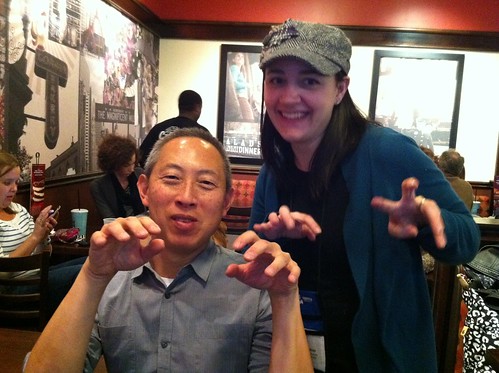
I love that analogy from Meredith Stewart, a 7th grade history teacher in North Carolina writing about her first Mozilla Hackasaurus hack jam.
Sponsored by the National Writing Project, the recent jam gave educators a chance to use Firefox and Hackasaurus to mess around with websites by changing the underlying HTML that makes them tick.
Meredith’s post about the experience perfectly captures the value of getting our hands dirty through webmaking, and reminded me of Mitchell Baker’s keynote on creation vs. one-way consumption at the Mozilla Festival. Meredith writes:
It’d be easy to say, “That sounds fun, but what’s the point?”
For me, mucking around in the HTML was like making bread from scratch or changing a tire. They’re activities in which I want to engage as an act of understanding and joy, not necessarily of utility or efficiency.
I think for ourselves and our students understanding the means of production are important, so that we can be responsible and thoughtful teachers, students, and humans.

The hack jam’s organizer, Andrea Zellner, also writes beautifully about revealing the hidden structures that make up our digital lives:
As more and more research and attention is paid to the ways our literate lives are mediated by interactions on the internet, less attention is paid to the function of the tools that get us there. How many facebook posters understand the algorithm of the newsfeed? How many people uploading content to Youtube understand the genesis of the embed code? There is an entire hidden structure of the webpages with which we interact that mediates the way we compose and present ourselves on the web.
Enter the hackjam: designed to make visible the hidden structure of the internet for K12 students (but most grownups I know would benefit, too!), these tools provide an entry into inquiry about the ways we are both freed and bounded by the hidden structure of the internet pages we visit. By developing our hacker selves, we are then empowered to move ourselves more critically through these spaces, rather than being led through them.
Hi Matt,
I, too, love Meredith’s baking bread analogy. We had a great time at the hackjam this weekend at NCTE. The guy in the picture up there is Paul Oh from the National Writing Project who helped me pull it off. Of course, it never would have worked without the power of Twitter. If you want to see the rest of the hacks we produced, check out the #hackjam hashtag on twitter.